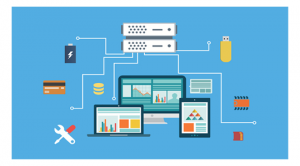In today’s world, it is impossible to imagine even a day without gadgets. The tremendous innovation in technology have made managing work, business and finance so much simpler that every organization is bound to implement these new technologies. However, as the number of intelligent devices rises, the potential damage that could be caused to the due to lack of security increases too. Hence, in order to protect these technologies and the data stored in them, password authentication and securities are advanced and made efficient day to day, to the maximum, for high security.
What is the future of authentication? How can it implement the ERP software system? Here’s an overview of these few questions that every business enterprise and organization are keen to learn about.

What is Authentication?
Authentication is simply a process that allows a technology or system to determine the true identity of a user. It’s a process that allows a user to access a technology only if the user credentials matches the credentials stored in the database. Commonly, this authentication begins with a login process that allows a user to access the technology with the required credentials, which normally consists of a User Id and Password. However such simple authentication processes are easier to hack and promise to be less secure.
Hence, to create a stronger authentication system, a better form of authentication biometrics is implemented, which ensures the physical presence of the user through various biological tests such as fingerprints, face recognition etc. Such authentication processes make it tougher to hack and ensure increased security.
Another secure authentication process that is highly implemented by reputed tools and technologies are the Public Key Infrastructure. This method uses digital certificates or public encrypted keys to prove the identity of a user. This method makes it more secure to exchange and store data over various networks.
With the growth in technology, these secure authentications are advanced from time to time and with the emerge of IoT (Internet Of Things) PKI’s are highly advanced and implemented for secure engagements.
How Future Of Authentication Can Implement ERP?
ERP (Enterprise Resource Planning) is a software that consolidates every aspect required for the smooth functioning of a manufacturing enterprise. As a manufacturing company requires multiple comprehensively designed systems to manage its movement, ERP software standardizes and shares data across the company using a single piece of software. When such software is extremely used for all major functions of an enterprise, it’s security and controlling its access, is of high concern.
Although, using a single software for multiple major activities of an enterprise sounds more relaxed and hassle-free, yet without proper security, ERP loses its power. Maintaining firewalls and encryptions, keeping user activity logs etc., are traditional forms of securing ERP. With advances in both technology and ERP, it’s essential to switch to the modern authentication process.
Two- Factor authentication is one such process that secures the ERP software even better. It is a process that does not rely on just one password for accessing the application. It ties the second factor to the user’s phone for a double layer of security. Such a system of authentication protects major applications against attacks like potential social engineering or phishing attacks.
ERP software is a one system solution for almost every enterprise, and securing its process and accessibility is a high priority concern. A cloud-based two-factor authentication solution is the next step towards a hassle-free and secured management of on-site hardware and software.
With drastic advances in technology and software, the ways and methods of hacking and attacking have flourished too. It has now become a necessity to implement high authenticated security systems in order to protect our systems against these attacks. Various companies and technologies are constantly improving authentication for a better and highly secure functioning of enterprises.


